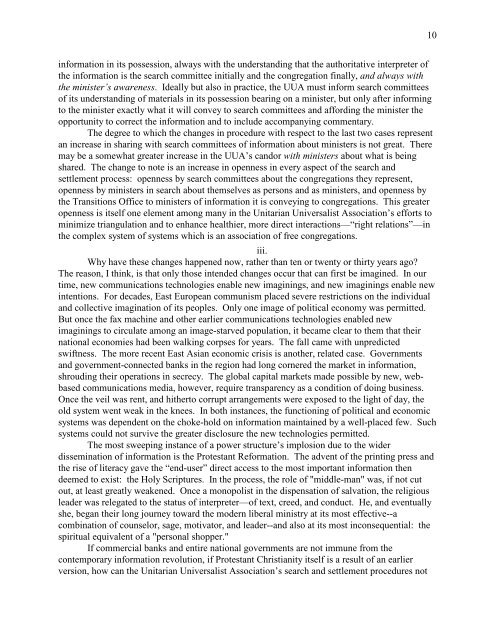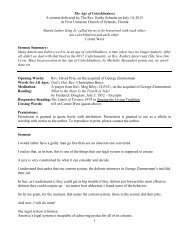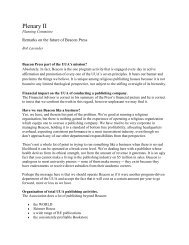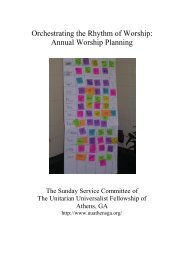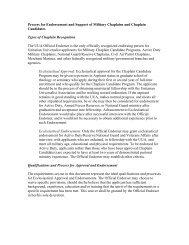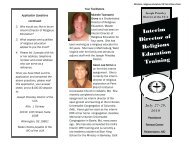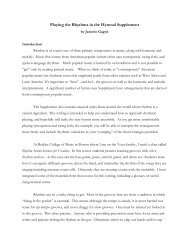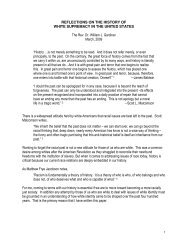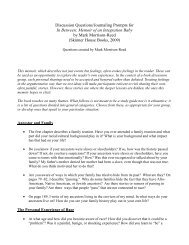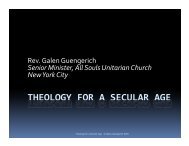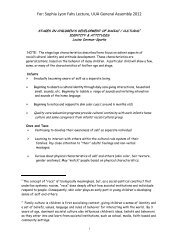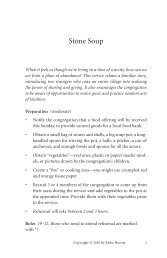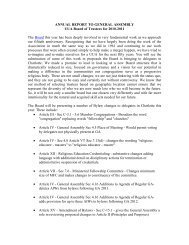MSR Guide - Unitarian Universalist Association
MSR Guide - Unitarian Universalist Association
MSR Guide - Unitarian Universalist Association
Create successful ePaper yourself
Turn your PDF publications into a flip-book with our unique Google optimized e-Paper software.
10<br />
information in its possession, always with the understanding that the authoritative interpreter of<br />
the information is the search committee initially and the congregation finally, and always with<br />
the minister’s awareness. Ideally but also in practice, the UUA must inform search committees<br />
of its understanding of materials in its possession bearing on a minister, but only after informing<br />
to the minister exactly what it will convey to search committees and affording the minister the<br />
opportunity to correct the information and to include accompanying commentary.<br />
The degree to which the changes in procedure with respect to the last two cases represent<br />
an increase in sharing with search committees of information about ministers is not great. There<br />
may be a somewhat greater increase in the UUA’s candor with ministers about what is being<br />
shared. The change to note is an increase in openness in every aspect of the search and<br />
settlement process: openness by search committees about the congregations they represent,<br />
openness by ministers in search about themselves as persons and as ministers, and openness by<br />
the Transitions Office to ministers of information it is conveying to congregations. This greater<br />
openness is itself one element among many in the <strong>Unitarian</strong> <strong>Universalist</strong> <strong>Association</strong>’s efforts to<br />
minimize triangulation and to enhance healthier, more direct interactions—“right relations”—in<br />
the complex system of systems which is an association of free congregations.<br />
iii.<br />
Why have these changes happened now, rather than ten or twenty or thirty years ago<br />
The reason, I think, is that only those intended changes occur that can first be imagined. In our<br />
time, new communications technologies enable new imaginings, and new imaginings enable new<br />
intentions. For decades, East European communism placed severe restrictions on the individual<br />
and collective imagination of its peoples. Only one image of political economy was permitted.<br />
But once the fax machine and other earlier communications technologies enabled new<br />
imaginings to circulate among an image-starved population, it became clear to them that their<br />
national economies had been walking corpses for years. The fall came with unpredicted<br />
swiftness. The more recent East Asian economic crisis is another, related case. Governments<br />
and government-connected banks in the region had long cornered the market in information,<br />
shrouding their operations in secrecy. The global capital markets made possible by new, webbased<br />
communications media, however, require transparency as a condition of doing business.<br />
Once the veil was rent, and hitherto corrupt arrangements were exposed to the light of day, the<br />
old system went weak in the knees. In both instances, the functioning of political and economic<br />
systems was dependent on the choke-hold on information maintained by a well-placed few. Such<br />
systems could not survive the greater disclosure the new technologies permitted.<br />
The most sweeping instance of a power structure’s implosion due to the wider<br />
dissemination of information is the Protestant Reformation. The advent of the printing press and<br />
the rise of literacy gave the “end-user” direct access to the most important information then<br />
deemed to exist: the Holy Scriptures. In the process, the role of "middle-man" was, if not cut<br />
out, at least greatly weakened. Once a monopolist in the dispensation of salvation, the religious<br />
leader was relegated to the status of interpreter—of text, creed, and conduct. He, and eventually<br />
she, began their long journey toward the modern liberal ministry at its most effective--a<br />
combination of counselor, sage, motivator, and leader--and also at its most inconsequential: the<br />
spiritual equivalent of a "personal shopper."<br />
If commercial banks and entire national governments are not immune from the<br />
contemporary information revolution, if Protestant Christianity itself is a result of an earlier<br />
version, how can the <strong>Unitarian</strong> <strong>Universalist</strong> <strong>Association</strong>’s search and settlement procedures not


